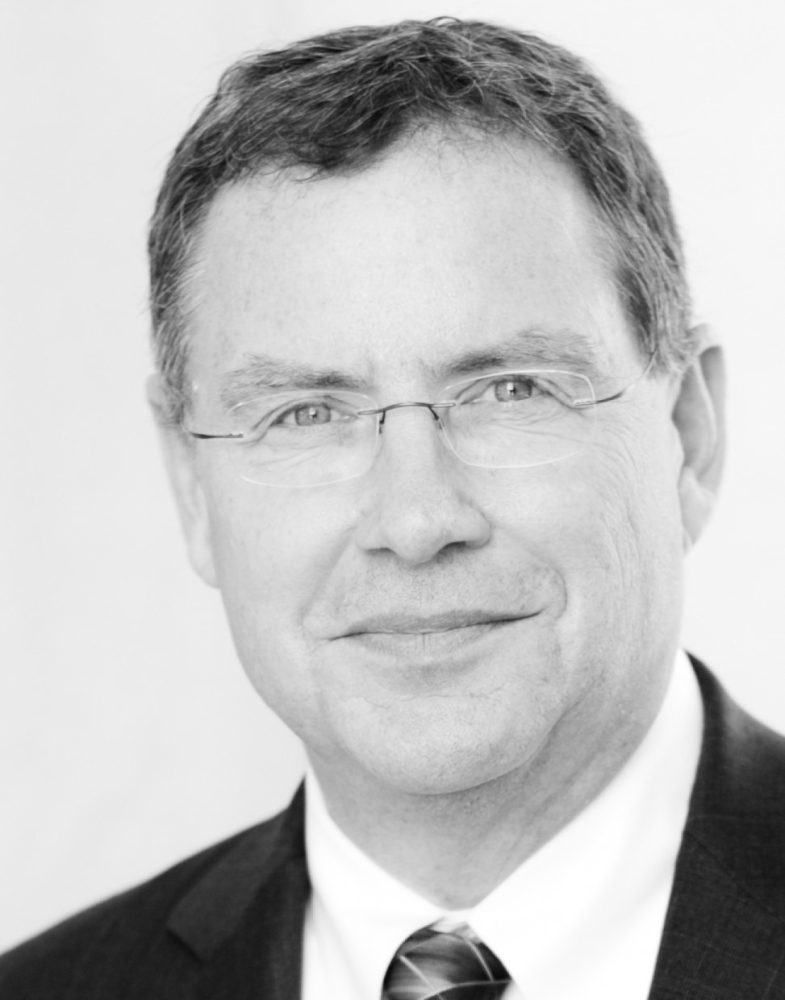In a system that increasingly favors the wealthy, Catholic teaching calls upon the government to step in and level the playing field.
[Read more from Stephen Schneck on the difficulties of politcal party affiliation as a Catholic.]
Growing up in Clinton, Iowa, Stephen Schneck remembers conversations around the kitchen table that often turned to the pressing political issues of the day—poverty, abortion, and the environment, among others. It was there that Schneck first learned how to look at challenging political questions in the context of his Catholic faith.
“My mom, when she was trying to decide on a political issue, she would think about the saints,” he recalls. “What would St. Francis do? What would St. Teresa think about this?”
Schneck has carried that outlook with him through his more than three decades of teaching politics and government, the last two of which have been spent in the nation’s capital. As a student of Catholic social teaching, he sees growing challenges for Catholics to remain engaged in the political process without compromising the values of their faith.
“Whether we’re on the Republican side or the Democratic side, it is so easy in American politics today to be nudged toward being only half-Catholic,” he says. “And the saints? None of them were half-Catholics.
“So if we’re looking for some kind of guiding stars to help us through in American politics, the lives of the saints might be the place to turn. I think my mom really had the right idea.”
There’s a lot of debate over how involved the government should be in people’s lives. What does Catholic teaching have to say about the role of government?
The popes in their social encyclicals have always argued that government has a responsibility to step up and to take care of all of its citizens by providing a safety net. Catholic teaching doesn’t leave us any room for debate—if charity isn’t doing the trick, then the government has a moral responsibility to fill that breach.
That’s not an add-on; it’s not something that can be subtracted. It is a basic part of Catholic social teaching that government itself has that responsibility to care for people if other means aren’t available to resolve these issues.
Why is poverty an issue Catholics should be concerned about?
I’ve been blessed with a real perspective on the level of need in America, with the poverty that’s out there. I actually know people who are poor. I know how they’re struggling and how they’re looking for work. I know how they’re embarrassed to go on public assistance or embarrassed to be at a grocery store paying for their kids’ Rice Krispies with food stamps.
I challenge people to think about their neighbors, their friends, and the people down the block who are truly down and out, who require some help to put food on the table for their kids. I challenge any Catholic to honestly be able to say we should cut food stamps and use that money to reduce taxation when looking for a solution to a real person’s problems.
When you see people who are struggling in the context of their daily lives, trying to make ends meet, trying to find a way to get out of that situation, then I think you realize that these safety nets are fundamentally important.
Won’t people just become too dependent on the safety net?
These safety nets should really act like trampolines. When you fall out of the middle class into these situations of poverty, the safety nets ought to be organized in such a way that they help you put food on your table for your kids and help you to pay your grandma’s medical bills. More importantly, they provide a way for you to get back into the ballgame.
Whether it’s through education or retraining or job consultation, these safety nets must help Americans succeed in rising from poverty.
Can we afford to keep spending taxpayers’ money on these kinds of programs?
I really think that we need to adjust the tax system to create more revenue. The system needs to be skewed in the way that people like Warren Buffet are arguing for: Tax revenue needs to come more from the top earners.
There are a lot of very wealthy people in this country that are paying very low taxes. We saw that Mitt Romney only paid 14 percent in income taxes last year. God bless his wonderful success, but somebody earning so many millions of dollars should at least be paying the top tax rate in this country, which I think is mid-30 percent.
Is it fair to expect some people to pay more taxes? Why not just tax everyone equally?
A flat tax? The idea here is that if all paid the same level of taxation, then it would spur people to earn more, eliminate disincentives on the rich to become richer, and thereby generate more revenue for government. Some claim it might also spur a rising tide in the economy that would raise all boats—even the poor’s. That might be an argument that some American conservatives would make in favor of establishing a flat tax. I’m dubious.
I’m not at all willing to say that it couldn’t fit within the context of Catholic social teaching. In fact, I think that it could. But in general, Catholic social teaching leans more in the direction of a sliding scale, what tax people often call progressive taxation.
We have to recognize that not everybody has the same capacity to give to the common good. And just as the adage puts it, of those to whom much is given, much is expected. And that’s Catholic thinking as well.
Is there anything wrong with some people being so wealthy?
It’s the sin of pride if a rich person imagines he’s rich because he’s earned it. Everything we have is a gift from God. Everything we have is not really ours, and it is surely not ours to do with as we please.
We’ve been given these things by God and so we only hold them in trust for his purposes. Recognizing the needs of others and the needs of the community are part of the responsibilities that come with that gift.
Why should the tax burden fall on those who earn more money?
Those whom God has blessed with talents and skills and wealth have a correspondingly greater responsibility that goes hand in hand with that. They are called to contribute more to the common good. And I think it is appropriate to expect people who are earning so much to be contributing a little bit more.
To look at it in a different way, a 10 percent tax on a billionaire might cut into his supply of caviar. But a 10 percent tax on somebody who’s living on Social Security, that would be cutting into their macaroni and cheese.
So from that perspective, a 10 percent, across-the-board tax on everybody would not impact everyone equally. It would really hurt those macaroni and cheese folks, but the caviar folks wouldn’t feel it at all.
How large is the gap between those two groups?
The vast proportion of American wealth can be found in just a tiny sliver of American citizens’ pockets. A very small percentage owns the biggest chunk of all the wealth in this country. This is the 99 percent versus 1 percent argument. But if you look at it, it’s really more like the top half of the 1 percent that owns so much.
This gap between the rich and everybody else in American society has been accelerating since about the mid-1990s. And it has been accelerating even more over the course of this great recession that we’ve been going through.
We’re seeing in the economic life of 99 percent of Americans an erosion in the quality of most people’s lives due to the fact that so much of our wealth is concentrated in fewer hands.
How did the wealth gap get so big?
We sometimes hear that the poor are poor because they’re lazy. But anybody who actually works with the poor quickly realizes that lots of people fall into the ranks of poverty from the middle class no matter how hard they work. The system really is rigged.
How so?
How many good schools are in poor neighborhoods? How many poor people have the network of friends and acquaintances to help them get a start-up loan for a new business? Is transportation available for the poor to even get to where the jobs are?
A friend told me about a woman he knows who was a flight attendant for an airline that went belly-up. She looked for a new position for two years. She was doing odd jobs to buy clothes for her kids, and she finally ended up needing food stamps.
After two years of no marketable employment, even when jobs opened up that she was qualified for, she couldn’t get hired because people saw those two years of unemployment and they wouldn’t give her a second look. She finally lost her home and ended up in public housing.
What happened to the idea that anyone can succeed in America?
It used to be that the United States, out of all of the countries in the world, provided people with the greatest chances to rise from poverty to wealth. If you worked hard and you followed the rules, you could make yourself prosperous. That was a real promise of America.
Now America is no longer at the forefront of that kind of economic mobility. You go to Europe if you want to see that kind of economic mobility. Or you go to Asia. America now is lagging behind other parts of the world in the capacity for citizens to achieve success simply by working hard.
How do you account for that change?
Well, there are a lot of explanations for it. I’m persuaded that some of it is a shift in American values.
I’m from a prairie state. There’s this myth, probably invented by Hollywood, that the prairie was tamed by “rugged individuals.” That’s just baloney. Ask the old folks on the prairie how it was settled and you learn that it was really one big barn-raising. Neighbor pitched in to help neighbor to bring in the harvest, make hay, build the town park, help with calving, and so on.
Today it’s all about the selfish individual trying to keep other people off his back and out of his pocket. But that’s not how America came to be the great nation it is. It was all of us joining together to help one another, barn by barn, for the common good.
How can we restore opportunities for people to rise out of poverty?
If you look at the way European economies work, and if you look at the way other successful economies around the world work that provide greater economic mobility, one of the things that you see is a very active role on the part of the government in trying to provide people with the tools for success.
You see things like education, support for businesses, and universal health care. Things that we don’t provide as a natural course here in the United States are provided there. And they function as infrastructures that allow citizens to then succeed on their own.
These economies are providing their citizens with better tools to succeed than seems to be the case in the United States today. One of the things we have to recognize is that in these economies, government is one of the mechanisms by which those tools are provided.
Does Catholic teaching really say we should rely so much on the government?
Catholic social teaching does include the principle of subsidiarity, which recommends that policies should be done at the lowest effective levels of authority. That’s an important teaching, but it can’t be separated from solidarity, which recommends that policies be part of a whole.
How does that work in practice?
The way that the church thinks about subsidiarity is not like American federalism. In other words, it’s not making an argument that the local is to always be preferred over the national. The Catholic understanding of subsidiarity recognizes that society is naturally organized into parts and layers.
Subsidiarity is making sure that each part plays its appropriate role. It’s wrong from the perspective of subsidiarity if the state oversteps its role, but it is also wrong if the local part oversteps its role. This natural understanding of society as corporately composed of parts is at the heart of the theory of subsidiarity.
How do we know when someone is overstepping their role?
Of course, that is a really tough question. The simple answer is that we’re supposed to recognize when one of the parts is overstepping its appropriate role when the common good is not being served.
So the measure for a good political order in traditional Catholic thought is this idea of the common good. And if the common good is not evident, is frayed, is eroding, then we can assume there is probably something wrong in subsidiarity. There is something wrong about the relationships of the parts to the whole.
Can you give an example?
I think that the Affordable Care Act is a wonderful example. Obviously we have lots of health care in the United States; lots of doctors, lots of hospitals, lots of medical technology of all sorts. And yet we had huge numbers—we still do have huge numbers—of Americans who have no immediate access to health care.
Sure, we have charitable institutions that have stepped up to try to do their part, and we have local institutions and volunteer organizations that have tried to do their part. But none of them were fully answering the need.
In my estimation that’s a pretty good example of the fraying of the common good. Then it is appropriate—not only appropriate, in fact, but maybe it is morally required—for the federal government to step up and fill that need for the common good, in this case by providing more universalized health care than was available before.
But don’t programs like those just escalate government spending?
I am not convinced that there’s some huge panacea when it comes to government spending. But the government needs to be organized a little bit better. I’m also not one of those people who believe that there’s a ton of waste in government, but we are sometimes spending our money oddly.
What would you change?
It would be appropriate to have means testing for Medicare. In other words, 70-year-old millionaires should probably have to pay a little bit, or at least not get as much Medicare coverage as people who are just living on Social Security payments. Means testing for Medicare would go a long way toward resolving the problems that Medicare poses.
You could probably say the same about Social Security. I’m blessed, thanks to my wife’s wonderful job, with a pretty comfortable situation. When I retire, I’m sure going to take Social Security if they give it to me, but I probably don’t actually need that money.
And I bet that’s true for a lot of other people in top tax brackets, so maybe we should have means testing for Social Security, too.
What other areas of spending could be adjusted?
I think we should focus on rearranging our government’s priorities in a way to better reflect what we Catholics recognize are the real concerns.
Given the winding down of two wars—the war in Iraq now is officially over, Afghanistan is coming to an end—it’s appropriate to start maybe trimming back some of our military spending. There are other areas where I would make some shifts in the budget itself.
Those kinds of cuts, combined with new revenues from that portion of Americans that are doing so well right now, would create a package that could work in balancing our budget.
What would a Catholic solution look like?
In Catholic social teaching, there’s an idea called distributive justice that comes into play here. Distributive justice is just a fancy way of saying that our teachings expect that the goods, the opportunities, and also the responsibilities of our public life should be divided fairly.
I don’t want to say that there’s anything unfair in being rich. But I do want to say that there’s something unfair about a system organized in such a way that the very rich can continue to accrue greater and greater wealth at the expense of the rest of us.
How is our current system unfair?
Is it fair that in the current system, more poor kids and middle class kids end up going into military service than rich kids? Or, how about this as an example regarding taxes: Should we allow mortgage tax write-offs on vacation homes, as we currently do?
Distributive justice helps us think about what’s fair in such cases. Catholic teaching wants a just distribution of the benefits and burdens in society.
Doesn’t that go against our American ideal of capitalism?
Capitalism is compatible with Catholic social teaching, except when it becomes a sort of soulless capitalism. For the last century the Catholic Church has argued that capitalism should not be simply free enterprise. Free enterprise needs to be guided and constrained by a set of values that we as Catholics recognize as being critical for the preservation and protection of the dignity of the human person.
There’s nothing wrong with capitalism. But we have to recognize that while capitalism can be a marvelous engine for generating prosperity, it can also—without those kinds of constraints, without that moral framework—be a real threat to human dignity.
Are there examples of that happening?
We see that today in parts of the world where unrestrained capitalism generates huge depredations on human life in slums and grinding working conditions in which people are committing suicide because their work is so onerous.
So capitalism without those values that we Catholics are organized around, capitalism without that kind of value structure that our faith can bring to it to guide and constrain it, without those things it actually just doesn’t work.
Does Catholic teaching offer a path toward a fairer economy?
A good example is the extraordinary document that came from the Pontifical Council for Justice and Peace last year, which analyzed the moral failing behind the current economic crisis.
What it essentially proposes is the creation of mechanisms to assure that those kinds of Catholic values are in place so that capitalism is not likely to threaten human dignity. It talks about the creation of international institutions that can provide that value framework within the operation of international free trade. I think it is a marvelous idea.
Didn’t a lot of Catholics reject that proposal?
I have to say I was shocked at the extent of negative reviews that it got. If anybody had actually compared it to the papal encyclicals, it was not an idea at all contrary to the church’s teachings. The arguments that the council puts out aren’t novel. These are, in fact, right out of the heart of Catholic social teaching itself, from the first social encyclical, Rerum Novarum, down to the present.
Why were some Catholics so strongly opposed to it?
I think that there is a huge ideological chasm in America today that divides us so very sharply into the left and right, into conservative and liberal, into Democrat and Republican. And on both sides of that chasm, you have Catholics who think that they’re completely Catholic, but in fact, maybe they’re only half-Catholic.
As Catholics, we’re increasingly starting to look at our own faith from the perspective of where we are in terms of that divide. And that’s sad.
How can we change that way of thinking?
As a church in the United States, we all need to find a way to step back and realize that being Catholic doesn’t fit being a good Democrat or a good Republican. It requires us to be something different than conservative and liberal, than left and right. And how we get there, that’s a really good question.
Does the church offer any guidance?
I really love the U.S. bishops’ document Forming Consciences for Faithful Citizenship. I think it’s one of the best things the bishops have ever done, but we need to figure out a way to translate that into the language that people talk in around the kitchen table. I don’t know how we do that, but that’s really a compelling need.
What do you see as the role of Catholics in political life today?
For so many generations here in the United States, Catholics really were second-class citizens. Because of that, the principal effort of Catholics in public life was to try to figure out a way to assimilate so that they could be indistinguishable, so that people wouldn’t look at you and know that you were Catholic.
Now we’re beyond worrying about assimilation. At least here in Washington among the people that I’m working with, there’s a growing recognition of the distinctiveness of being Catholic in the way that we participate in political life. And I see this on both the right and the left.
I’m not saying that the divide I talked about doesn’t split us a little bit. But what unites us is a growing awareness that being Catholic is to be somehow distinctive in politics, to be distinctive as an American citizen. Maybe we’re seeing the emergence of a new Catholic consciousness in the United States.
This article appeared in the July 2012 issue of U.S. Catholic (Vol. 77, No. 7, pages 18-22).
Image: Photo courtesy of Stephen Schneck













Add comment